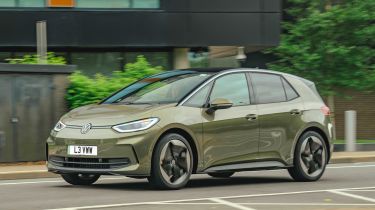Volkswagen ID.3 review: running costs & insurance
The Volkswagen ID.3 should be much cheaper to run than an equivalent Volkswagen Golf for most drivers – especially company-car users
| Insurance group | Warranty | Service interval | Annual company-car tax cost (20%/40%) |
|---|---|---|---|
| 25-27 | 3yrs/60,000 miles | 2yrs/20,000 miles | From £148/£296 |
The simplified and recently-updated Volkswagen ID.3 range now starts at just over £37,000, bringing pricing back down to a level on par with key rivals like the Kia Niro EV and Renault Megane E-Tech. The bargain MG4 is still several thousand pounds cheaper, however – even in flagship Trophy guise. The ID.3 is still quite a lot more expensive than a Volkswagen Golf, but it does come with a lot more standard equipment at least.
Stick to home charging and you can save a lot in running costs on your ID.3 – with the average UK electricity price at 34p/kWh, driving 10,000 miles per year in an ID.3 would cost around £800. Frequent rapid charges from pricey public points will see those costs rise, though. The current electric-car Benefit-in-Kind company-car tax rate of 2%, plus exemption from the London Congestion Charge until 2025, will see business users and those living in or near the capital saving even more money.
Volkswagen ID.3 insurance group
Entry-level Volkswagen ID.3 Pro cars sit in insurance group 25, while Pro S cars are slightly more expensive to cover, sitting in group 27 – that's about average for this kind of electric car, with the more powerful Nissan Leaf getting the same rating. Volkswagen offers its own insurance with a three-year fixed-price rate for the car. You’re not tied in, so after a year you can always switch if you find a better price.
Warranty
All Volkswagen cars are covered by a three-year/60,000-mile manufacturer's warranty, which is on par with the industry standard, but falls some way behind the seven-year cover you get on a Kia or Hyundai. The ID.3's batteries are also protected by an eight-year/100,000-mile warranty, should their ability to hold a charge degrade significantly in that time.
Servicing
All of Volkswagen's ID. electric cars have a fixed service schedule, which involves a simple inspection service after two years. From then, it’s every year or 20,000 miles, whichever arrives soonest. This means the ID.3 should be a lot cheaper to service than a petrol, diesel or hybrid model – and with no oil to change, services are cheaper, too.
Road tax
You currently don’t have to pay vehicle excise duty (VED), otherwise known as road tax, on an ID.3 or any other electric car, although the government has announced this will change from 2025. It costs very little as a company car, too, as the ID.3’s current Benefit-in-Kind (BiK) tax band is just 2%.
Depreciation
For what is essentially an electrified Volkswagen Golf, the ID.3 is pretty expensive to buy outright for private buyers. According to the latest industry data, the ID.3 is expected to hold onto anything between 49-54% of its value over three years and 36,000 miles. Entry-level Pro models perform the best in this regard, costing buyers roughly £17,000 to own – this is average for the class, with a Tesla Model 3 losing slightly more to depreciation than the VW.

